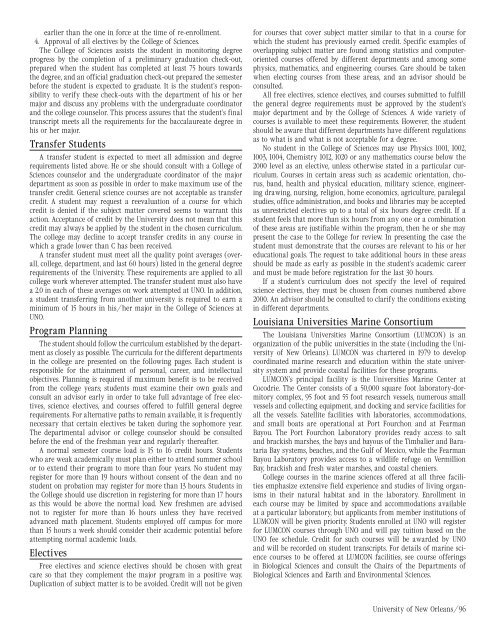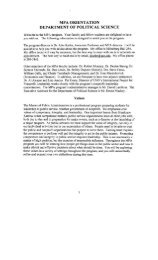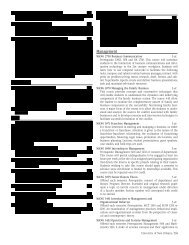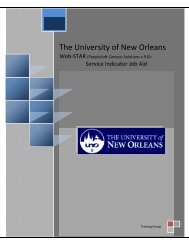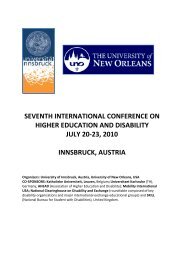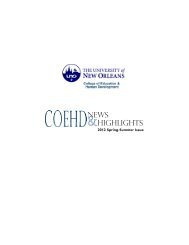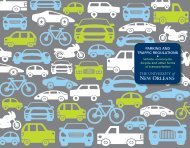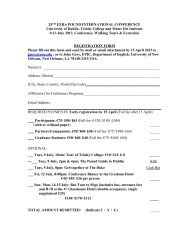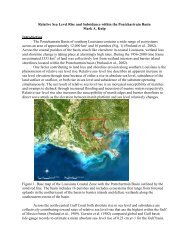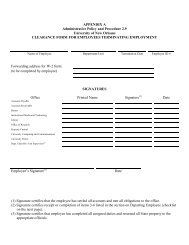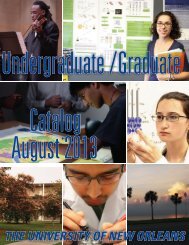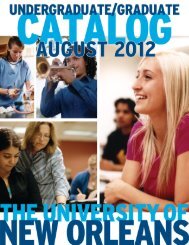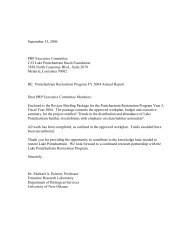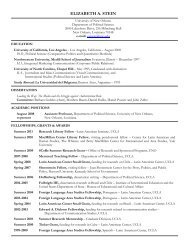Untitled - University of New Orleans
Untitled - University of New Orleans
Untitled - University of New Orleans
Create successful ePaper yourself
Turn your PDF publications into a flip-book with our unique Google optimized e-Paper software.
earlier than the one in force at the time <strong>of</strong> re-enrollment.<br />
4. Approval <strong>of</strong> all electives by the College <strong>of</strong> Sciences.<br />
The College <strong>of</strong> Sciences assists the student in monitoring degree<br />
progress by the completion <strong>of</strong> a preliminary graduation check-out,<br />
prepared when the student has completed at least 75 hours towards<br />
the degree, and an <strong>of</strong>ficial graduation check-out prepared the semester<br />
before the student is expected to graduate. It is the student’s responsibility<br />
to verify these check-outs with the department <strong>of</strong> his or her<br />
major and discuss any problems with the undergraduate coordinator<br />
and the college counselor. This process assures that the student’s final<br />
transcript meets all the requirements for the baccalaureate degree in<br />
his or her major.<br />
Transfer Students<br />
A transfer student is expected to meet all admission and degree<br />
requirements listed above. He or she should consult with a College <strong>of</strong><br />
Sciences counselor and the undergraduate coordinator <strong>of</strong> the major<br />
department as soon as possible in order to make maximum use <strong>of</strong> the<br />
transfer credit. General science courses are not acceptable as transfer<br />
credit. A student may request a reevaluation <strong>of</strong> a course for which<br />
credit is denied if the subject matter covered seems to warrant this<br />
action. Acceptance <strong>of</strong> credit by the <strong>University</strong> does not mean that this<br />
credit may always be applied by the student in the chosen curriculum.<br />
The college may decline to accept transfer credits in any course in<br />
which a grade lower than C has been received.<br />
A transfer student must meet all the quality point averages (overall,<br />
college, department, and last 60 hours) listed in the general degree<br />
requirements <strong>of</strong> the <strong>University</strong>. These requirements are applied to all<br />
college work wherever attempted. The transfer student must also have<br />
a 2.0 in each <strong>of</strong> these averages on work attempted at UNO. In addition,<br />
a student transferring from another university is required to earn a<br />
minimum <strong>of</strong> 15 hours in his/her major in the College <strong>of</strong> Sciences at<br />
UNO.<br />
Program Planning<br />
The student should follow the curriculum established by the department<br />
as closely as possible. The curricula for the different departments<br />
in the college are presented on the following pages. Each student is<br />
responsible for the attainment <strong>of</strong> personal, career, and intellectual<br />
objectives. Planning is required if maximum benefit is to be received<br />
from the college years; students must examine their own goals and<br />
consult an advisor early in order to take full advantage <strong>of</strong> free electives,<br />
science electives, and courses <strong>of</strong>fered to fulfill general degree<br />
requirements. For alternative paths to remain available, it is frequently<br />
necessary that certain electives be taken during the sophomore year.<br />
The departmental advisor or college counselor should be consulted<br />
before the end <strong>of</strong> the freshman year and regularly thereafter.<br />
A normal semester course load is 15 to 16 credit hours. Students<br />
who are weak academically must plan either to attend summer school<br />
or to extend their program to more than four years. No student may<br />
register for more than 19 hours without consent <strong>of</strong> the dean and no<br />
student on probation may register for more than 13 hours. Students in<br />
the College should use discretion in registering for more than 17 hours<br />
as this would be above the normal load. <strong>New</strong> freshmen are advised<br />
not to register for more than 16 hours unless they have received<br />
advanced math placement. Students employed <strong>of</strong>f campus for more<br />
than 15 hours a week should consider their academic potential before<br />
attempting normal academic loads.<br />
Electives<br />
Free electives and science electives should be chosen with great<br />
care so that they complement the major program in a positive way.<br />
Duplication <strong>of</strong> subject matter is to be avoided. Credit will not be given<br />
for courses that cover subject matter similar to that in a course for<br />
which the student has previously earned credit. Specific examples <strong>of</strong><br />
overlapping subject matter are found among statistics and computeroriented<br />
courses <strong>of</strong>fered by different departments and among some<br />
physics, mathematics, and engineering courses. Care should be taken<br />
when electing courses from these areas, and an advisor should be<br />
consulted.<br />
All free electives, science electives, and courses submitted to fulfill<br />
the general degree requirements must be approved by the student’s<br />
major department and by the College <strong>of</strong> Sciences. A wide variety <strong>of</strong><br />
courses is available to meet these requirements. However, the student<br />
should be aware that different departments have different regulations<br />
as to what is and what is not acceptable for a degree.<br />
No student in the College <strong>of</strong> Sciences may use Physics 1001, 1002,<br />
1003, 1004, Chemistry 1012, 1020 or any mathematics course below the<br />
2000 level as an elective, unless otherwise stated in a particular curriculum.<br />
Courses in certain areas such as academic orientation, chorus,<br />
band, health and physical education, military science, engineering<br />
drawing, nursing, religion, home economics, agriculture, paralegal<br />
studies, <strong>of</strong>fice administration, and books and libraries may be accepted<br />
as unrestricted electives up to a total <strong>of</strong> six hours degree credit. If a<br />
student feels that more than six hours from any one or a combination<br />
<strong>of</strong> these areas are justifiable within the program, then he or she may<br />
present the case to the College for review. In presenting the case the<br />
student must demonstrate that the courses are relevant to his or her<br />
educational goals. The request to take additional hours in these areas<br />
should be made as early as possible in the student’s academic career<br />
and must be made before registration for the last 30 hours.<br />
If a student’s curriculum does not specify the level <strong>of</strong> required<br />
science electives, they must be chosen from courses numbered above<br />
2000. An advisor should be consulted to clarify the conditions existing<br />
in different departments.<br />
Louisiana Universities Marine Consortium<br />
The Louisiana Universities Marine Consortium (LUMCON) is an<br />
organization <strong>of</strong> the public universities in the state (including the <strong>University</strong><br />
<strong>of</strong> <strong>New</strong> <strong>Orleans</strong>). LUMCON was chartered in 1979 to develop<br />
coordinated marine research and education within the state university<br />
system and provide coastal facilities for these programs.<br />
LUMCON’s principal facility is the Universities Marine Center at<br />
Cocodrie. The Center consists <strong>of</strong> a 50,000 square foot laboratory-dormitory<br />
complex, 95 foot and 55 foot research vessels, numerous small<br />
vessels and collecting equipment, and docking and service facilities for<br />
all the vessels. Satellite facilities with laboratories, accommodations,<br />
and small boats are operational at Port Fourchon and at Fearman<br />
Bayou. The Port Fourchon Laboratory provides ready access to salt<br />
and brackish marshes, the bays and bayous <strong>of</strong> the Timbalier and Barataria<br />
Bay systems, beaches, and the Gulf <strong>of</strong> Mexico, while the Fearman<br />
Bayou Laboratory provides access to a wildlife refuge on Vermillion<br />
Bay, brackish and fresh water marshes, and coastal cheniers.<br />
College courses in the marine sciences <strong>of</strong>fered at all three facilities<br />
emphasize extensive field experience and studies <strong>of</strong> living organisms<br />
in their natural habitat and in the laboratory. Enrollment in<br />
each course may be limited by space and accommodations available<br />
at a particular laboratory, but applicants from member institutions <strong>of</strong><br />
LUMCON will be given priority. Students enrolled at UNO will register<br />
for LUMCON courses through UNO and will pay tuition based on the<br />
UNO fee schedule. Credit for such courses will be awarded by UNO<br />
and will be recorded on student transcripts. For details <strong>of</strong> marine science<br />
courses to be <strong>of</strong>fered at LUMCON facilities, see course <strong>of</strong>ferings<br />
in Biological Sciences and consult the Chairs <strong>of</strong> the Departments <strong>of</strong><br />
Biological Sciences and Earth and Environmental Sciences.<br />
<strong>University</strong> <strong>of</strong> <strong>New</strong> <strong>Orleans</strong>/96


